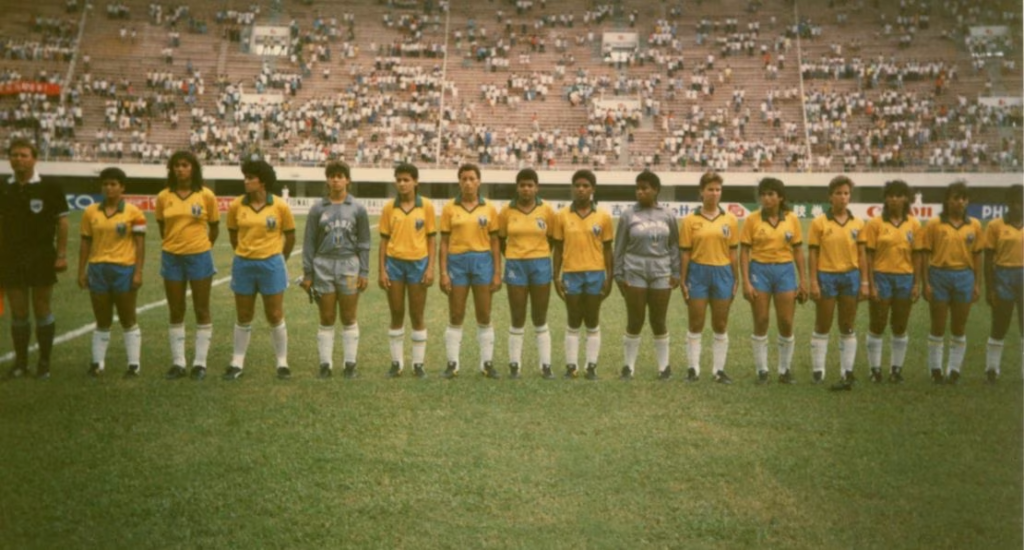
Brasil: Lica, Marisa, Elane, Sandra, Fanta, Lúcia, Marcinha, Sissi, Pelezinha, Roseli, Cebola.
It was with this lineup, on June 1, 1988, that Brazil played its first match in a Fifa competition.
Introduction:
In a country where soccer is more than just a sport, but a national passion, the story of women’s soccer in Brazil is a narrative of resistance, resilience, and triumph. The journey of Brazilian women’s soccer, from a prohibited and marginalized activity to a popular cultural and sporting phenomenon, reflects a powerful change in social dynamics and perseverance. In the 1940s, reflecting the conservative norms of society, the Brazilian government banned women from playing soccer, claiming it was incompatible with feminine nature. This ban, which lasted until 1979, represented a period of silencing and exclusion for women in the country’s most beloved sport.
However, the passion for soccer among Brazilian women could not be contained. In defiance of social norms and the government decree, stories emerged of women who dared to play soccer, often in secret and sometimes facing legal and social consequences. This resistance not only kept the spirit of women’s soccer alive during the years of prohibition but also sowed the seeds for its eventual rebirth and success.
In the shadows of this prohibition, spirited Brazilian women covertly organized and played soccer, defying both social norms and the law. These clandestine matches, held in hidden locales or with women disguised as men, were not just for the love of the game; they were acts of defiance and liberation.
With the repeal of the ban in 1979, women’s soccer in Brazil began to emerge from the shadows. What followed was a period of slow but progressive acceptance and growth. Brazilian women not only claimed their place on the soccer fields but also began to challenge preconceived notions of gender and ability in sports. From the struggle for legalization to rising in international competitions, Brazilian women’s soccer transformed from an act of resistance to a popular phenomenon, celebrated and admired.
This is the story not just of a sport, but of an ongoing fight for equality, recognition, and respect. It is a story of how Brazilian women turned adversity into opportunity, marking their indelible place in the rich tapestry of Brazilian soccer.
The journey of these women through decades of struggle was not just about securing a place on the soccer field, but it was also a fight for recognition, respect, and equality. The prohibition of women’s soccer by the Brazilian government in the 1940s under Getúlio Vargas’ regime was more than a restriction on sports; it was a reflection of the societal norms and gender biases of the time. Women’s soccer in Brazil became a symbol of resistance against these biases and a fight for their rightful place not only in sports but also in society
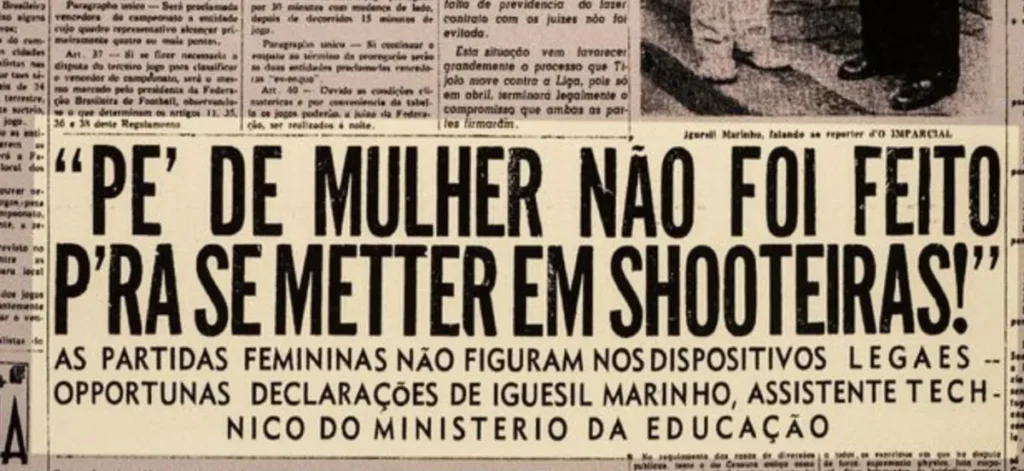
Parallels of Resistance: The Shared Struggle of Women’s Soccer and Brazilian Arts
The struggle for women’s soccer in Brazil paralleled the cultural movement of Tropicalismo during the 1960s. Like the female athletes, artists in this movement challenged traditional norms and political repression, using music and the arts as tools for social commentary and change.
The fight for the right to play women’s soccer during the decades of prohibition in Brazil is part of a broader tapestry of cultural and artistic resistance. In periods marked by authoritarian regimes, such as the Estado Novo and the Military Dictatorship, various forms of artistic expression faced challenges similar to women’s soccer, battling against censorship and repression to keep the flame of freedom and expression alive.
Cinema and Theater under the Spotlight of Censorship: During these times, the film industry and theatrical productions often found themselves under the watchful eyes of censors. Works that dared to question the status quo or criticize the government were banned or severely altered. Artists in these fields faced the difficult task of balancing creative expression with imposed limitations, often resorting to subtle and metaphorical forms of criticism.
Literature: Words Against Repression: Brazilian writers also suffered from censorship, with many literary works being banned or censored. Literature thus became a subtle space of resistance, with authors using allegories and symbolism to challenge restrictions and communicate their messages.
Music: Melodies of Challenge and Hope: Brazilian popular music, with iconic figures like Chico Buarque and Caetano Veloso, became a powerful instrument of political and social resistance. Despite censorship and even exile, music continued to be a vehicle for expressing discontent and hope, deeply resonating with the Brazilian population.
The interconnection between women’s soccer and the arts during periods of oppression highlights a common struggle for freedom and equality in Brazil. Whether on the soccer field or the stages and pages of art, Brazilians showed remarkable resilience. They not only challenged prohibitions but also shaped a future where free expression and equality could flourish. In various fronts, the spirit of cultural resistance helped pave the way for a freer and more equal Brazil.

Era of Prohibition: Resistance Against Repression
The story of women’s soccer in Brazil during the era of prohibition is deeply intertwined with the country’s broader political and social context. In 1941, under the Estado Novo regime led by Getúlio Vargas, a decree-law was enacted that prohibited sports deemed inappropriate for women, including soccer. This legislation mirrored the conservative attitudes of the era, viewing women’s participation in certain sports as detrimental to morality and feminine nature.
This ban emerged during a period of modernization and urbanization in Brazil, yet the country remained anchored in traditional and patriarchal values. Soccer, a national passion, was strictly seen as a male domain, and the notion of women participating in the sport was often met with mockery and hostility.
Despite such restrictions, numerous women across Brazilian cities defied the ban. They organized clandestine matches in hidden locations, sometimes even disguised as men, to indulge their passion for the sport. These games were acts of love for soccer and, more significantly, acts of resistance against oppressive norms. In certain cases, these women faced not only social disapproval but also legal repercussions, including detainment by the police.
During this period, local newspapers and sympathetic journalists played a pivotal role. They often covertly supported the women’s soccer movement, offering coverage that subtly questioned the prevailing norms and provided a platform for these pioneering athletes.
Simultaneously, the prohibition inadvertently nurtured a robust underground soccer movement. Women’s teams continued their secret matches, frequently on improvised fields in rural areas or concealed urban spaces. This era saw the rise of unsung heroes – women who braved societal judgment and legal consequences to keep the spirit of soccer alive. These matches were more than mere games; they symbolized defiance against a system attempting to confine women to traditional roles.
A significant instance of this resistance occurred in Belo Horizonte, where women were arrested in 1940 for playing soccer on the streets. Although these incidents were isolated, they exemplify the determination and courage of women challenging societal norms and asserting their right to participate in sports.
Beyond the players themselves, there were activists, often affiliated with sports clubs or feminist movements, who fought against the ban. They utilized the press, petitions, and other advocacy forms to challenge the legislation and advocate for gender equality in sports, arguing that soccer could be a tool for women’s emancipation and empowerment.
Throughout the nearly four decades of prohibition, women’s soccer in Brazil remained largely invisible and marginalized. Nevertheless, the persistence and courage of these women ensured that the spirit of the game lived on. Their resistance laid the groundwork for the eventual resurgence of women’s soccer in the country following the repeal of the ban in 1979.
The era of prohibition in women’s soccer stands as a testament to the strength and resilience of Brazilian women. They confronted oppressive laws and unfavorable social attitudes, maintaining their love for the game and paving the way for future generations, thereby creating a legacy that transcends the sport itself.

The Rebirth of Women’s Soccer
A pivotal moment in the history of Brazilian women’s soccer occurred in 1988 when the national team participated in the FIFA Invitation Tournament in China. This event marked their debut on the international stage, setting the stage for future successes and establishing Brazil as a formidable presence in women’s soccer.
The year 1979 was a watershed moment, as it witnessed the repeal of the ban that had been in place since 1941. This significant act not only acknowledged the injustice of the prohibition but also laid the foundation for the formal organization of women’s soccer in Brazil. In the ensuing years, the groundwork for a structured approach to women’s soccer began to take shape, characterized by the formation of leagues and participation in international competitions.
The journey towards organizing the sport, however, was fraught with significant challenges. Key issues like inadequate infrastructure, insufficient investment, and lack of institutional support posed constant hurdles. Despite these obstacles, the unwavering passion and determination of the women involved in the sport played a crucial role in driving the development of both local and national competitions. This period saw traditional soccer clubs start to form women’s teams, and women’s soccer leagues began to emerge, offering a platform for budding talent.
The 1990s marked an era of significant progress for Brazilian women’s soccer. The national team’s participation in international competitions, including the FIFA World Cup and the Olympic Games, not only elevated the sport’s visibility in Brazil but also showcased the talent and potential of Brazilian players on a global scale.
The reintroduction of women’s soccer into Brazil’s sports arena, however, was met with several challenges. The early years following the lifting of the ban saw women’s teams struggling with inadequate support, subpar infrastructure, and limited recognition. Nevertheless, the persistent efforts of players, coaches, and supporters gradually fostered a shift in perception. The 1990s emerged as a turning point, with the Brazilian women’s national team achieving notable success in international competitions, thereby highlighting the prowess and potential of Brazilian women in soccer.
Icons of Brazilian Women’s Soccer
Among the most emblematic figures of Brazilian women’s soccer, Marta Vieira da Silva and Miraildes Maciel Mota, known as Formiga, stand out. Marta, often referred to as the ‘female Pelé,’ is widely recognized as one of the greatest female soccer players of all time. Her technical skill, game vision, and goal-scoring ability have placed her in the international spotlight. She has been a key component of the Brazilian national team and an inspiration for countless young players around the world.
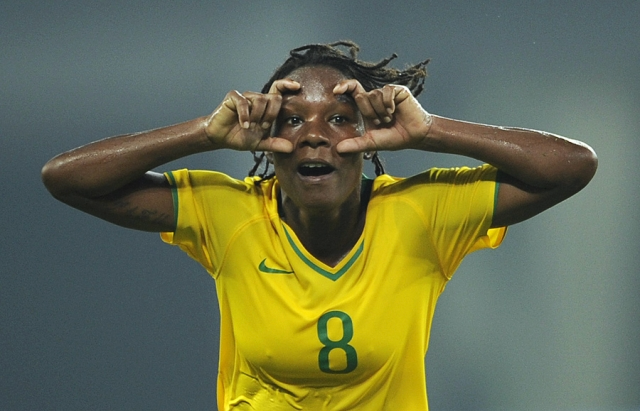
Formiga, on the other hand, is an icon of longevity and dedication. Her career with the Brazilian national team spans over two decades, a remarkable feat demonstrating her extraordinary physical fitness and commitment to the sport. She has been a fundamental pillar for the national team in various international competitions, earning global respect and admiration.
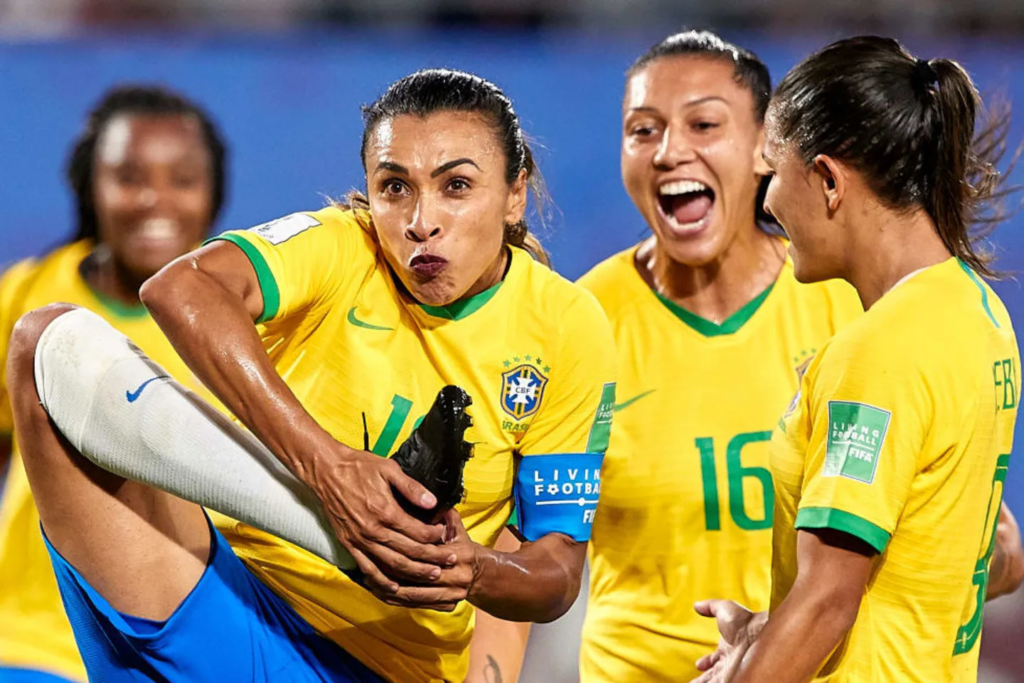
In addition to Marta and Formiga, many other Brazilian players have made names for themselves abroad, playing for renowned foreign clubs. The presence of these players in international leagues has not only raised the profile of Brazilian women’s soccer but also contributed to the technical and tactical development of the players. Their international experience has brought a wealth of knowledge and skills, strengthening the national team and inspiring the next generations.
The influence of players like Marta and Formiga, and many others who followed in their footsteps, is immeasurable. They have not only raised the standard of play but also changed perceptions of women’s soccer, both within and outside of Brazil. Their careers are testaments to what can be achieved with talent, dedication, and an opportunity to shine, and they continue to be sources of inspiration for girls and women aspiring to follow in their footsteps in the sport.
Another icon, Sissi, known for her exceptional creativity and technical skills, played an instrumental role in Brazil’s early international exposure. Her contributions on the field helped elevate Brazilian women’s soccer on the global stage.
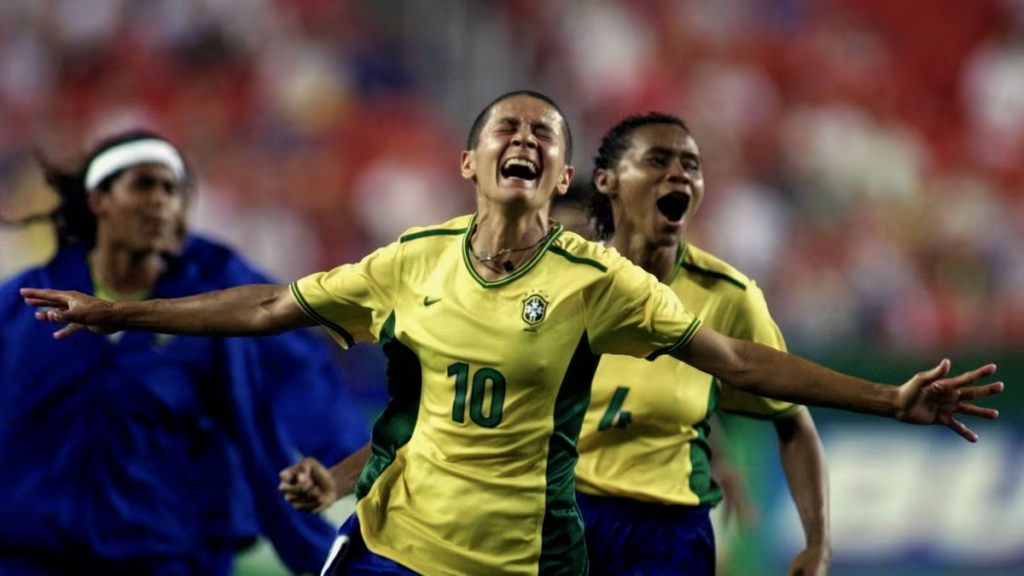
Contemporary Challenges and Achievements
Despite significant advancements, women’s soccer in Brazil, much like in many parts of the world, continues to grapple with gender disparities. These disparities are particularly evident in areas such as investment, infrastructure, and media coverage. Unlike men’s soccer, which enjoys considerable financial and institutional backing, women’s teams frequently face the challenge of limited resources. The deficiency of adequate training fields, proper facilities, and sustained financial support stands as a significant barrier impeding the full realization of the sport’s potential in Brazil.
This struggle for equality and better resources in women’s soccer is not confined to the borders of Brazil. It reflects a global narrative, where women’s teams across the world, including prominent national teams like the USA, are advocating for equal pay and improved training facilities. These global movements resonate with the challenges faced in Brazil, highlighting the universal nature of the fight for gender equality in sports.
At this critical juncture, Brazilian women’s soccer finds itself balancing significant strides in recognition and popularity against the ongoing battle for parity with the men’s game. Issues such as pay disparity, inadequate media coverage, and insufficient investment in grassroots development remain pressing concerns. However, a positive shift has been observed in recent years, marked by increased media attention and growing support from fans and sports institutions.
In addition, cultural and societal perceptions continue to pose challenges. Women’s soccer often still battles stereotypes and prejudices, being viewed as secondary to the men’s game. Despite these obstacles, Brazilian women’s soccer has managed to celebrate notable achievements. The sport’s growing popularity is clear, with a rise in fanbase and media visibility. National competitions, like the Brazilian Women’s Soccer Championship, have been gaining recognition and attracting a larger audience, reflecting a change in societal attitudes towards women’s sports.
In summary, the journey of women’s soccer in Brazil mirrors a broader global challenge of achieving gender equality in sports. While considerable progress has been made, the path ahead requires persistent efforts to break down remaining barriers and promote a culture that values and supports women’s soccer on an equal footing with men’s.
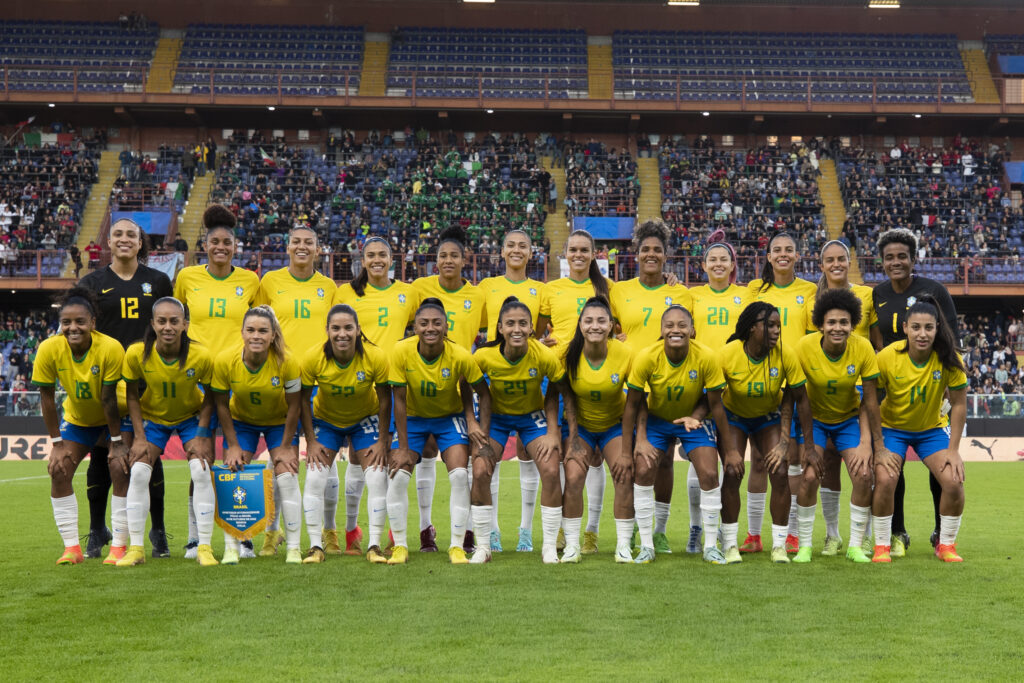
Projections for the Future of Women’s Soccer
The future of women’s soccer in Brazil is not just a national concern but also part of a global movement towards recognizing and elevating women’s sports. With a new generation of Brazilian players coming up, inspired by the likes of Marta and Formiga, there is a tangible sense of optimism. These athletes are not only aiming for greater achievements within their own borders but also seeking to make a mark on the international stage.
The increasing interest among Brazil’s youth in women’s soccer mirrors a worldwide trend, where more and more young girls are drawn to the sport. This global wave of enthusiasm, combined with a potential increase in investment and media coverage in Brazil, could significantly amplify the sport’s status and impact, both nationally and internationally.
The prospects for women’s soccer in Brazil are bright. The anticipated growth in investment and resources, alongside increased professionalization of the sport, promises to nurture a fertile environment for budding talent. More clubs are expected to invest in their women’s teams and to establish academies dedicated to nurturing young talents, a trend that aligns with global practices.
The push for gender equality in soccer, a global issue, remains a priority in Brazil. Efforts to ensure that female players receive the same recognition and support as their male counterparts are crucial not just for the sport’s growth in Brazil but also for setting a precedent in the international sports community.
The journey of Brazilian women’s soccer mirrors a broader global shift towards greater inclusivity and equality in sports. As we witness these positive changes, it is vital to maintain momentum and continue advocating for a future where women in soccer have equal opportunities to excel and inspire, both on and off the field
Conclusion:
In conclusion, the journey of Brazilian women’s soccer is a testament to resilience, determination, and the relentless pursuit of equality. From the challenging days of prohibition to the current era of growing recognition, these incredible athletes have not only made their mark on the field but have also been at the forefront of challenging societal norms and advocating for gender equality. Their story is not just about soccer; it’s a beacon of hope, symbolizing the power of perseverance, resilience, and the enduring fight for equal rights.
As we reflect on their journey, it becomes clear that the path ahead still presents challenges. However, with continuous support, recognition, and a concerted effort towards ensuring equal opportunities and resources, women’s soccer in Brazil is well-positioned to continue its upward trajectory. It’s essential to celebrate their achievements and work collectively to overcome the remaining obstacles.
The story of women in Brazilian soccer serves as a powerful reminder that passion, resilience, and determination can overcome the most daunting barriers. Looking towards the future, it is crucial that we continue to support and champion these athletes, acknowledging their past struggles while working towards a future where equality and respect in sports are not merely ideals but tangible realities





